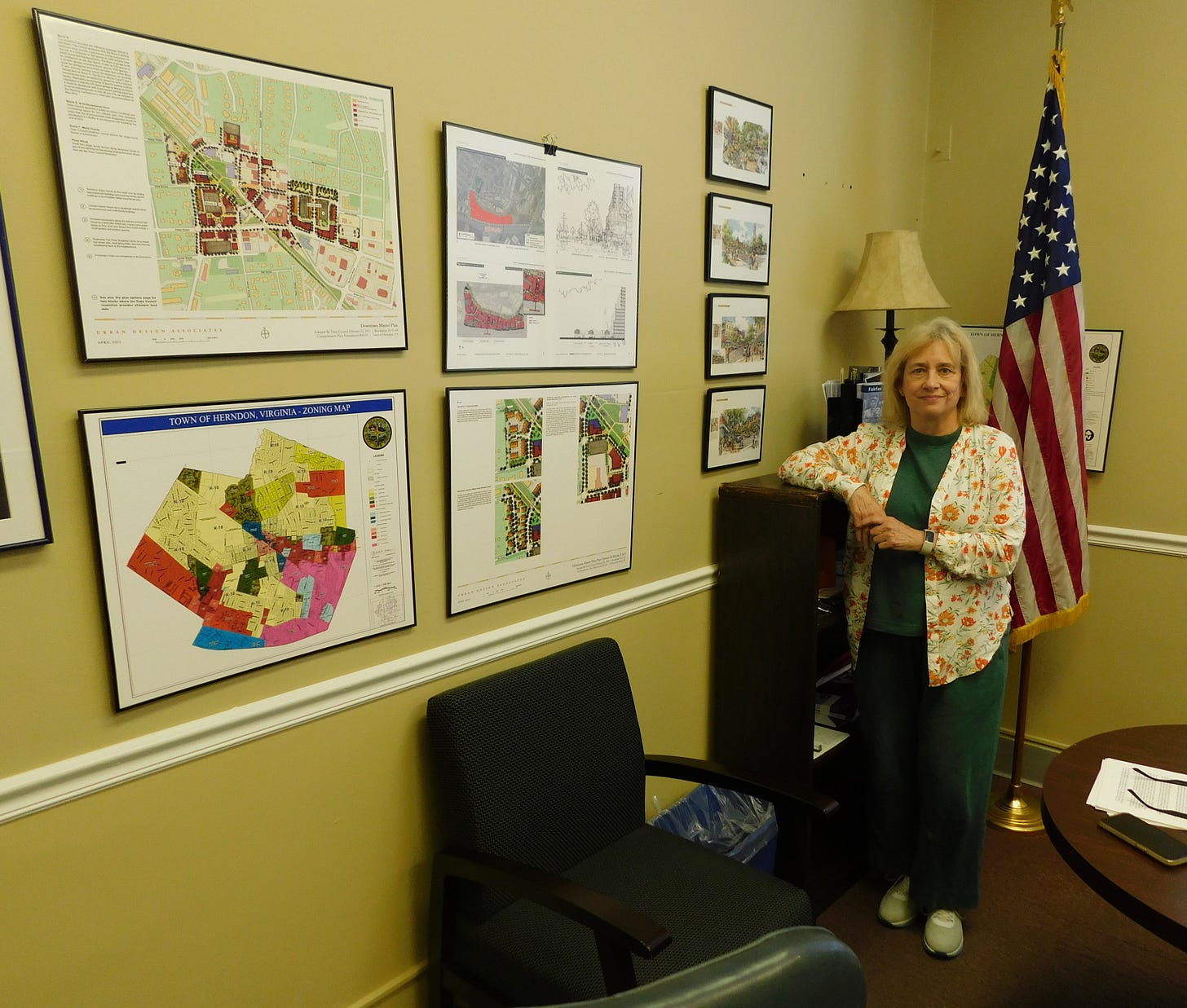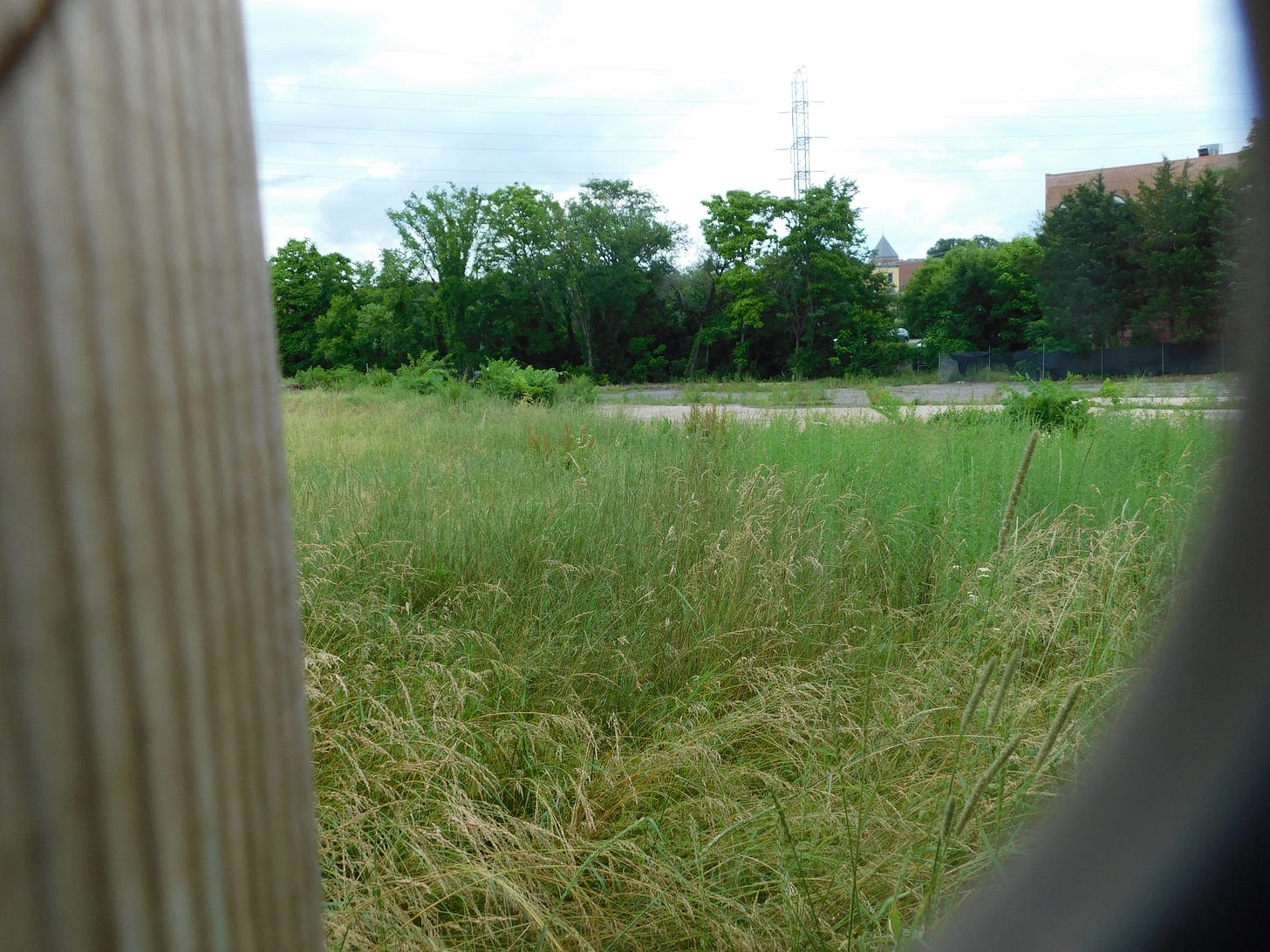Herndon’s mayor wants downtown redevelopment — but she’s no ‘dictator’
10-ish questions with Sheila Olem on the end of the Herndon Festival, what she’s learned through grief and why we should all be volunteering more

Sheila Olem was elected mayor of Herndon in 2020, the year when “everything stopped” — the town festivals, the in-person meetings, the musicians playing impromptu sets on the little town green. She would sit in her cul-de-sac just so she could wave to neighbors walking their dogs.
Olem, who had lived in Herndon since 1990, ran on “getting us through covid.” In 2022, she won reelection.
But she swore off a third term during that last campaign, she told The Machine, when one of her daughters-in-law nearly died after giving birth. Olem’s own husband, Harvey, had disappeared on a flight over the Andes Mountains in 1994, leaving her a single mom with two young boys and a remolded perspective on what matters.
“If I get elected, I’m going to serve, but I’m not running again,” Olem recalled thinking, in an interview at her office in the Old Town Hall. “I didn’t say it publicly, but I just thought, yeah, I can’t do this.”
There’s more left to steer — Herndon’s stalled downtown redevelopment plan, for one — and building community matters to Olem, who’s eager to trumpet the town’s “Friday Night Live!” music series. But the work soon will fall to new and other leaders.
Olem says she hopes they follow the compass that she’s tried to on the town council and as mayor: hearing folks out first, taking action second.
“There’s always two sides to every story. There might be 20 sides,” she said. “Nothing’s ever black and white. I hate that; I would like it to be.”
Life, she learned a long time ago by now, can be much more complicated.
The following interview has been edited for length and a bit for clarity.
1. You’ve lived in Herndon since 1990. How have you seen it change over that time?
To me, it’s that we have more resources. In the ’90s, people in the community looked around and went, “Oh my goodness, all these children don’t have their well checkups and their vaccinations,” because they didn’t have health insurance, because they couldn’t afford it.
So we started a free clinic. It was at the middle school, one day a week. Then they finally raised some money and named it the Herndon Free Clinic. Now it’s called HealthWorks. You can even get dental care there, adult care, everything. They [distributed] covid vaccines.
Cornerstones is located in Reston, but they’re all over to help raise money for food, pregnant women, infants who need formula. Those resources have really grown. It’s not perfect, but I’ll go to other parts of Fairfax County, like to a fundraiser for a women’s club, and they’re just shocked at the kids [Herndon has] on free and reduced lunches.
2. Everyone has their perception of what a mayor’s job is, but every job, every town, every government is different. What’s something about being the mayor of Herndon that people might not understand?
They think it’s almost like you’re a dictator. No, you’re not. You’ve got a group, and you vote. Everyone gets a vote on our council, and if the vote is 4-3, and I voted with the three, then whatever I wanted doesn’t go.
I’m the chairperson of the council, the spokesperson. It’s [also] part-time.
3. The Herndon Festival was an early-summer town staple for four decades. In December, you and other Herndon leaders announced it was ending. What was that decision-making process like? Who gets involved in a decision like that?
Our town manager had our [retiring] head of parks and rec come in and talk to the council about what the obstacles were. It was a partnership. The festival committee was a group of individuals, and then they had some group in charge of the music; at one time they had three beer vendors, and then they would have all the arts and crafts and ways to vet them, and then you had all the businesses, and then you had the rides. You’re trying to contain anyone drinking so you didn’t have problems.
The last one that we had, in ’23, they almost didn’t have enough volunteers. After covid, people were concerned. If you don’t have enough volunteers, you can’t run big things like that.
4. You’ve done a lot of volunteer work yourself. What have you learned from those experiences?
If you want to have a vibrant community, people, get out there. You can just pick one thing. You don’t have to do everything.
I became a widow in ’94, and I just wanted some adult interaction, and so I started volunteering with different groups. It gave me an opportunity to be involved with the community, and then I could also meet new people.
5. For readers who might not know, a few years after your family moved to Herndon, your husband, Harvey, disappeared on a plane over a remote part of Bolivia. You lobbied the U.S. government tirelessly to search for him. Did you ever feel as if you could get closure?
Of course not. There was no plane. None of those five men were found. I have a lot of empathy for anyone with an “MIA” in their family.
6. How do you carry that, carry him, with you in the work you do and the life you live in Herndon today?
I had a friend going through cancer treatment that was also a friend of my late husband, and she wouldn’t tell me about it, and then I found out. I said, “Why didn’t you tell me?” She said, “Well, you had too much on your plate.” And I said, “I’d like to get something off of my plate, you know, think about you for a while.”
Sometimes we think we’re helping someone who’s going through a disaster, but they want to be alive in the moment. They don’t want to just go in a closet and grieve whatever they’re grieving. So, I kind of like being out there.
7. Last week, the town council approved a streeteries pilot program. What do you hope that brings, and what might the challenges be?
We had already approved an outdoor seating option for downtown restaurants, and we didn’t have any restaurants apply for the permit. During the governor’s [pandemic] State of Emergency, many building codes were relaxed to help restaurants survive. Now, ADA access on sidewalks and access to restaurants are back in force. If you build more seating, you have to have more bathrooms. So, I’m not sure that we’re going to get tons of people doing this.
There’s a belief that this is going to generate lots of revenue, only we sat there in a meeting and added it up, and it was a very teeny amount. They’re thinking the meals tax is going to bring in all this extra money for the town, but unless it’s a million dollars that we’re taxing that 3.75 percent …
You’re skeptical of the impact.
It’s not that I’m skeptical. I’m thinking the math doesn’t work, and that’s public land that we’re giving away, and we’re asking our staff to go put time into it. Sixty-some-odd-percent of our money goes to staff, because we provide services. I’m kind of a numbers person.
The fireworks we do on the Fourth of July: That’s a lot of money, [but] it entertains tons of people. Herndon staff are ready to work with business owners should they apply.

8. Herndon’s broader downtown redevelopment — retail, apartments, an arts center, parking — has been in the works since before you became mayor. But Comstock still hasn’t started construction, and the town pushed its recent late-April deadline to August. Do you expect Comstock to hit that?
On one day I did, and another day I’m talking to people in the banking business, and I’m like, [sighs]. I don’t know if the interest rate is going to go down.
This is a very small development, because our community would like to keep it small. That does make Herndon different. You come into the downtown, it has that little hometown feeling. You go to Reston Town Center, you’re in the towers. It is what it is. To keep that, you’re also losing, for a developer, the opportunity to build bigger.
Before covid hit, somebody* put tariffs on steel. Covid hit, the price of plywood quadrupled. And now the interest rates have gone through the roof. These are pretty darn legitimate reasons. A lot of time and energy has gone into all of this, and it would be a shame just to walk away.
*then-President Donald Trump.
9. Do you ever think about leaving?
Where would I go? I have friends that keep saying, “You should move down to Norfolk with [my younger son] Matt.” I say, “Oh, so [my older son] Mike’s going to think I’ve deserted him.”
Besides, Matt may not want me living next to him.






To set the story straight, the town limited how many volunteers they wanted and what they were allowed to do. The festival was not canceled due to lack of volunteers and I wish that would stop being said.